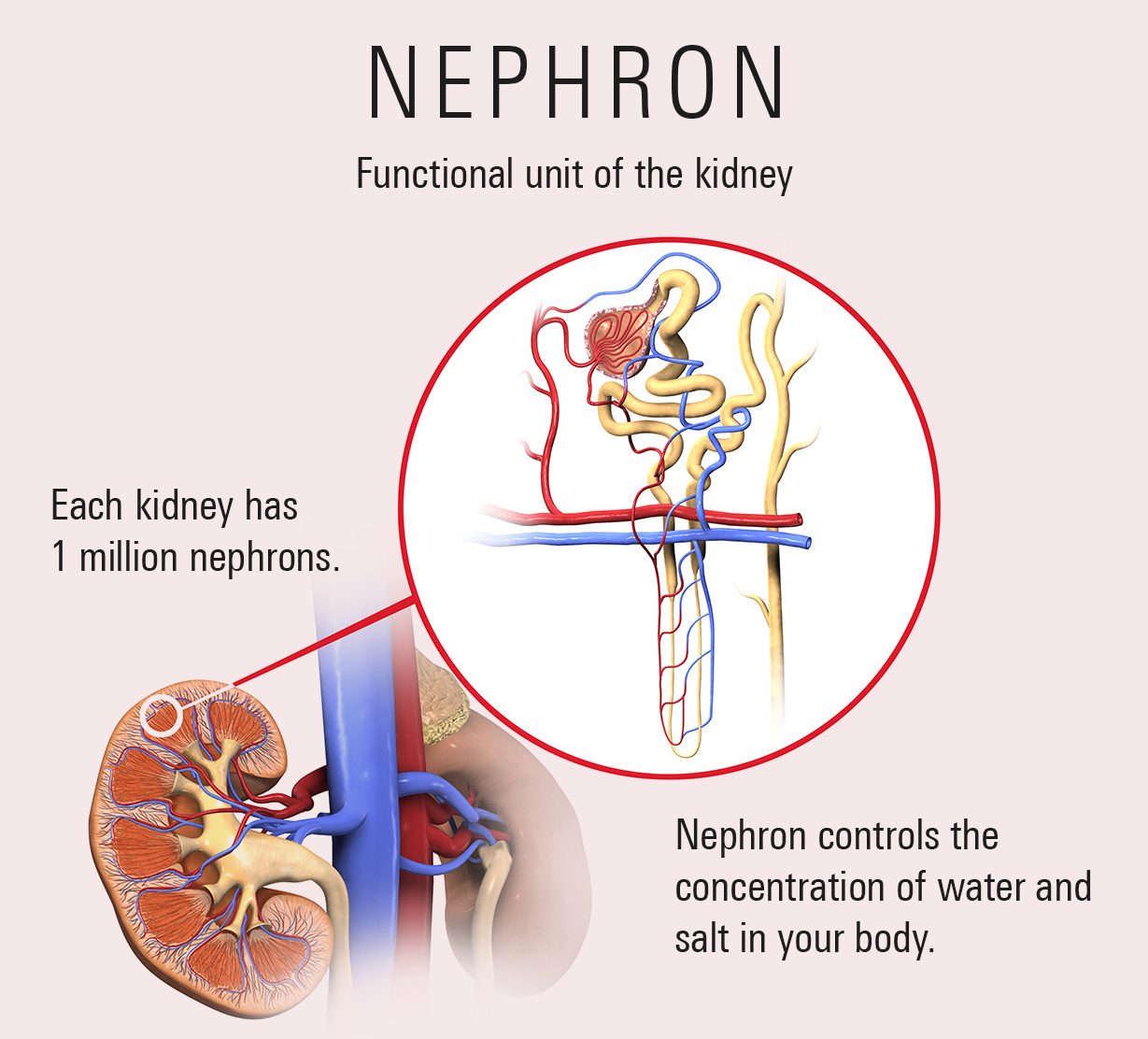Stages of Chronic Kidney Disease
Chronic kidney disease (CKD) affects 1 in 7 (approximately 14%) American adults each year, and millions more are at greater risk. 9 in 10 adults with CKD don’t know that they have the disease.
How does the kidney function?
The primary function of your kidneys is to filter/clean your blood by expelling waste products like toxins, extra salt and water, and chemicals. Wastes can build up in your blood and cause serious illnesses if your kidneys are damaged and not functioning properly.
Why are your kidneys so important?
Your kidney’s main structural and functional component is referred to as the nephron. The purpose of your nephron is to control the concentration of water and sodium. Your nephron restores what is essential to your blood and excretes the rest through urination. Nephrons also play a role in controlling blood pressure and blood volume.

Chronic Kidney Disease (CKD)
A medical condition known as chronic kidney disease (CKD) is a gradual and permanent decline of kidney function over months or years.
The amount of albumin (a protein in your blood) in your urine and your glomerulus filtration rate (GFR) are both indicators of how well your kidneys are functioning.
Stages of CKD
There are 5 stages of chronic kidney disease. The stages are based on GFR (glomerular filtration rate) through a blood test. GFR checks how well the kidneys are filtering waste and extra fluid out of your blood.
| CKD Stage | Terms | GFR (mL/min/1.73 m2) |
| Stage 1 | Normal or High | > 90 + Kidney damage |
| Stage 2 | Mild decrease | 60–89 + Kidney damage |
| Stage 3 | Mild-moderate decrease Moderate-severe decrease |
45–59 30–44 |
| Stage 4 | Severe decrease | 15–29 |
| Stage 5 | Kidney failure | < 15 or dialysis dependent |
Complications
Wastes can accumulate to high amounts in your blood and make you feel ill if your renal disease progresses. You might develop diseases such as:
- CKD mineral and bone disorder (CKD-MBD)
- Individuals with renal impairment frequently have CKD-MBD, which affects practically people receiving dialysis.
- Hyperphosphatemia (exceedingly high levels of serum phosphate)
- Hyperphosphatemia can cause bone disease, bone fracture and secondary hyperparathyroidism, a condition your body produces high amount of parathyroid hormone (PTH)
- Vitamin D deficiency and secondary hyperparathyroidism
- Lack of vitamin D worsens the bone disease, lowers immunity, and raises the risk of cardiovascular disease.
- Vitamin D deficiency can cause parathyroid hormone levels to go up, causing secondary hyperparathyroidism (skewed calcium and phosphate levels)
- Anemia
- Erythropoietin (EPO), which is typically produced by your kidneys and transfers to your bone marrow to promote the production of red blood cells (RBCs), is the primary cause of anemia in individuals with CKD.
- EPO synthesis diminishes with deteriorating renal function. Anemia symptoms like weariness and pale skin are brought on by this decreased hemoglobin level.
- Hyperkalemia
- Hyperkalemia is defined as potassium levels > 5.3 or > 5.5 mEq/L (normal level is 3.5-5 mEq/L).
- In most cases, hyperkalemia is not brought on by high dietary potassium consumption unless there is severe renal impairment. Renal failure from reduced renal excretion is the most frequent cause of hyperkalemia.
Medication Options
Prolonged increases in blood glucose levels and/or blood pressure can impair your renal function and raise albumin levels in your urine.
The first-line medications used to prevent the progression of disease in individuals with CKD, diabetes, and/or hypertension if albuminuria is present include:
A diuretic medication may be used to help your body in removing excessive fluid.
CKD Symptoms
If kidney damage advances gradually, signs and symptoms of CKD may appear over time.
- Vomiting
- Nausea
- Increased or decreased urination, particularly at night
- Bitter taste in your mouth
- Muscle cramps
- Itchy/dry skin
- Decreased appetite
- Difficulty sleeping and/or concentrating
- Fatigue, decreased energy, and/or weakness
- Chest pain/discomfort—due to the accumulation of fluids around the lining of your heart
- Swollen arms, feet, and/or ankles
- Experience puffy eyes, particularly in the morning
- Skin darkening over time
- Hypertension (increased blood pressure)
- Shortness of breath—due to the accumulation of fluids around in your lungs
Causes of CKD
Hypertension (high blood pressure)
- If your blood pressure against the walls of your blood vessels elevates, you will develop high blood pressure, otherwise known as hypertension. High blood pressure can be a major contributor to heart attacks, strokes, and chronic kidney diseases if it is not well managed or is not managed at all.
Diabetes
- When your blood sugar levels are elevated for an extended period of time, you develop diabetes.
- Uncontrolled blood sugar levels over time can harm your kidneys, heart, blood vessels, nerves, eyes, etc.
The advancement of end-stage renal disease (ESRD) can be delayed and kidney damage can be avoided by managing your blood pressure and blood sugar levels.
Risk Factors
The risk of developing CKD is highest in African-Americans, Hispanics, American Indians, as well as Asians.
Other common risk factors:
- Hypertension
- Diabetes
- Family history of CKD
- Abnormal kidney structure
- Heart disease
- Greater than 60 years of age
- Possess a history of painkiller use, including the use of over-the-counter (OTC) medications (i.e. aspirin and ibuprofen).
Speak With Your Doctor
If you experience any kidney disease symptoms or indications, talk to your healthcare provider right away. If kidney disease is detected early on, kidney failure could be avoided.
Talk to your doctor about which treatment option is best for you and send your prescription to Marley Drug. Save up to 95% compared to your local pharmacy by using Marley Drug.
